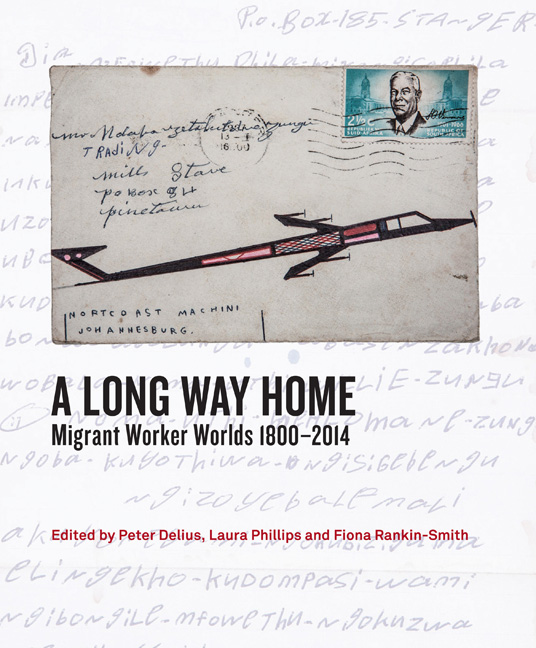Book contents
- Frontmatter
- Contents
- Acknowledgements
- Introduction: Highlighting Migrant Humanity
- Chapter 1 Ngezinyawo - Migrant Journeys
- Chapter 2 Slavery, Indenture and Migrant Labour: Maritime Immigration from Mozambique to the Cape, c.1780–1880
- Chapter 3 Walking 2 000 Kilometres to Work and Back: The Wandering Bassuto by Carl Richter
- Chapter 4 A Century of Migrancy from Mpondoland
- Chapter 5 The Migrant Kings of Zululand
- Chapter 6 The Art of Those Left Behind: Women, Beadwork and Bodies
- Chapter 7 The Illusion of Safety: Migrant Labour and Occupational Disease on South Africa's Gold Mines
- Chapter 8 ‘The Chinese Experiment’: Images from the Expansion of South Africas ‘Labour Empire’
- Chapter 9 ‘Stray Boys’: The Kruger National Park and Migrant Labour
- Chapter 10 Surviving Drought: Migrancy and the Homestead Economy
- Chapter 11 Migrants from Zebediela and Shifting Identities on the Rand, 1930s–1970s
- Chapter 12 Verwoerd's Oxen: Performing Labour Migrancy in Southern Africa
- Chapter 13 ‘Give My Regards to Everyone at Home Including Those I No Longer Remember’: The Journey of Tito Zungu's Envelopes
- Chapter 14 Sophie and the City: Womanhood, Labour and Migrancy
- Chapter 15 Bungityala
- Chapter 16 Migrants: Vanguard of the Worker's Struggles?
- Chapter 17 Debt or Savings? Of Migrants, Mines and Money
- Chapter 18 Post-Apartheid Migrancy and the Life of a Pondo Mineworker
- Notes on Contributors
- List of Figures and Tables
- Index
Chapter 1 - Ngezinyawo - Migrant Journeys
Published online by Cambridge University Press: 04 July 2018
- Frontmatter
- Contents
- Acknowledgements
- Introduction: Highlighting Migrant Humanity
- Chapter 1 Ngezinyawo - Migrant Journeys
- Chapter 2 Slavery, Indenture and Migrant Labour: Maritime Immigration from Mozambique to the Cape, c.1780–1880
- Chapter 3 Walking 2 000 Kilometres to Work and Back: The Wandering Bassuto by Carl Richter
- Chapter 4 A Century of Migrancy from Mpondoland
- Chapter 5 The Migrant Kings of Zululand
- Chapter 6 The Art of Those Left Behind: Women, Beadwork and Bodies
- Chapter 7 The Illusion of Safety: Migrant Labour and Occupational Disease on South Africa's Gold Mines
- Chapter 8 ‘The Chinese Experiment’: Images from the Expansion of South Africas ‘Labour Empire’
- Chapter 9 ‘Stray Boys’: The Kruger National Park and Migrant Labour
- Chapter 10 Surviving Drought: Migrancy and the Homestead Economy
- Chapter 11 Migrants from Zebediela and Shifting Identities on the Rand, 1930s–1970s
- Chapter 12 Verwoerd's Oxen: Performing Labour Migrancy in Southern Africa
- Chapter 13 ‘Give My Regards to Everyone at Home Including Those I No Longer Remember’: The Journey of Tito Zungu's Envelopes
- Chapter 14 Sophie and the City: Womanhood, Labour and Migrancy
- Chapter 15 Bungityala
- Chapter 16 Migrants: Vanguard of the Worker's Struggles?
- Chapter 17 Debt or Savings? Of Migrants, Mines and Money
- Chapter 18 Post-Apartheid Migrancy and the Life of a Pondo Mineworker
- Notes on Contributors
- List of Figures and Tables
- Index
Summary
In 2004, I participated as one of the curators in an important exhibition entitled ‘Democracy X: Marking the Present – Re-Presenting the Past’, held in the Castle galleries of Iziko Museums in Cape Town.
The flagship exhibition formed part of the celebrations to mark a decade of democracy in South Africa. The exhibition covered the long sweep of South African history – from the first traces of human past, in ochre fragments with engraved lines, found at the Blombos caves in the Eastern Cape and dating back 70 000 years to the present. The exhibition used significant objects pertaining to migrancy, documents and other forms of archive that explored the history, politics and culture of South Africa from past to present. Curator Sandra Klopper and I were assigned to source objects and items that best exemplified migrancy and migrant culture. Although it was only a small part of the ‘Democracy X’ exhibition, I discussed with Peter Delius, a historian on the curatorial team, the desirability of staging a comprehensive exhibition about migrant labour. Responsible for multiple transformations wrought in our society over 200 years and across southern and central Africa, the richness of this subject seemed worthy of much more serious interrogation for a future exhibition.
‘Ngezinyawo — Migrant Journeys’ takes that seed of an idea and extends across disciplines to include film, photography, artworks, artefacts from ethnographic collections, archival documents, interviews and other forms, such as performance, music and dance, in ways that explore the rich and diverse ramifications of the migrant labour system that has built South Africa's economy. The exhibition takes place in three levels of the Wits Art Museum at the University of the Witwatersrand, Johannesburg: in the Street and Core Galleries on the ground level, the Strip space, which is half way to the basement space, and the Mezzanine, which is the upper level of the Wits Art Museum display areas.
Journey/transformation
The theme of journeying is threaded metaphorically throughout the exhibition, constantly referring to travelling between spaces, on foot originally. The journeys made by men from rural to urban spaces in search of labour were often very long and full of danger and hardships.
- Type
- Chapter
- Information
- A Long Way HomeMigrant Worker Worlds 1800–2014, pp. 17 - 35Publisher: Wits University PressPrint publication year: 2014



